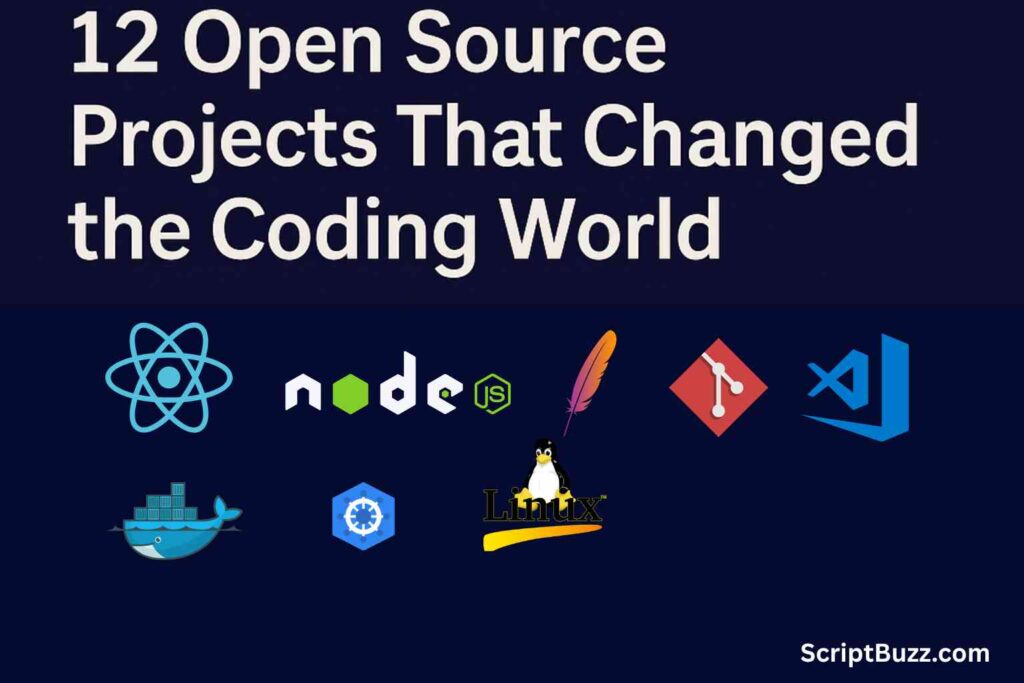12 Open Source Projects That Changed the Coding World
Open source software has radically reshaped the programming landscape over the past few decades. It has made world-class development tools freely available to everyone—from hobbyists to tech giants. In this guide, we explore 12 powerful open source projects that have forever changed how we build, deploy, and manage software systems.
Whether you’re a student, a seasoned engineer, or a startup founder, understanding these tools is essential to modern software development.

Why Open Source Matters
Open source isn’t just a development model—it’s a global movement that thrives on transparency, collaboration, and community contribution. These benefits have fueled the success of countless innovations.
Key Advantages:
- Free to use and modify
- Massive community support
- Rapid bug fixes and feature releases
- Security through transparency
- Freedom from vendor lock-in
Web Development Game Changers
1. Node.js
- Category: JavaScript Runtime
- Official Site: nodejs.org
Node.js introduced JavaScript on the server-side, enabling full-stack JavaScript applications. It excels in real-time applications, APIs, and scalable microservices.
Highlights:
- Based on Chrome’s V8 engine
- Event-driven, non-blocking architecture
- Powers platforms like Netflix, LinkedIn, and PayPal
2. React.js
- Category: UI Library
- Official Site: reactjs.org
Created by Facebook, React changed front-end development by making user interfaces modular, reusable, and reactive.
Highlights:
- Virtual DOM for high performance
- Component-based architecture
- Backbone of modern tools like Next.js and React Native
3. Apache HTTP Server
- Category: Web Server
- Official Site: httpd.apache.org
One of the oldest and most reliable web servers, Apache serves millions of websites and applications today.
Highlights:
- Part of the LAMP stack
- Flexible configuration via modules
- Compatible with PHP, Python, Perl, and more
Data Management Pioneers
4. PostgreSQL
- Category: Relational Database
- Official Site: postgresql.org
PostgreSQL is an advanced open-source SQL database known for reliability, performance, and extensibility.
Highlights:
- ACID compliant
- Complex queries and indexing
- JSON support and full-text search
5. Redis
- Category: In-Memory Data Store
- Official Site: redis.io
Redis is a fast, in-memory key-value store ideal for caching, real-time analytics, and session management.
Highlights:
- Data structures like sets, hashes, sorted sets
- Built-in replication and persistence
- Powers apps like Twitter, GitHub, and StackOverflow
6. Elasticsearch
- Category: Search Engine
- Official Site: elastic.co
Elasticsearch allows full-text and structured search across huge datasets with blazing speed.
Highlights:
- Distributed and horizontally scalable
- Works with Kibana and Logstash (ELK stack)
- Used by Wikipedia, eBay, and GitHub
Developer Tools That Transformed Productivity
7. Git
- Category: Version Control System
- Official Site: git-scm.com
Git is the world’s most popular version control system, created by Linus Torvalds, the creator of Linux.
Highlights:
- Branching and merging support
- Local-first architecture
- Backbone of platforms like GitHub, GitLab
8. Visual Studio Code (VS Code)
- Category: Source Code Editor
- Official Site: code.visualstudio.com
Developed by Microsoft, VS Code is a lightweight, customizable editor with power-packed features.
Highlights:
- Integrated terminal and Git support
- Rich extension ecosystem
- Popular among web and Python developers alike
9. Jupyter Notebook
- Category: Interactive Notebook
- Official Site: jupyter.org
Jupyter is the go-to environment for data scientists and machine learning practitioners.
Highlights:
- Combine code, visualizations, and markdown
- Supports Python, R, Julia, and more
- Ideal for data exploration, modeling, and teaching
DevOps & Containerization Tools
10. Docker
- Category: Container Platform
- Official Site: docker.com
Docker made it easy to package applications with all dependencies into containers—ensuring consistent performance across all environments.
Highlights:
- Faster deployment and scaling
- Eliminates “it works on my machine” issues
- Compatible with cloud services and CI/CD tools
11. Kubernetes
- Category: Container Orchestration
- Official Site: kubernetes.io
Developed by Google, Kubernetes automates deployment, scaling, and management of containerized applications.
Highlights:
- Auto-scaling and load balancing
- Rolling updates and self-healing
- Essential in cloud-native architecture
12. Linux
- Category: Operating System
- Official Site: kernel.org
Linux powers everything—from Android smartphones to servers, embedded systems, and supercomputers.
Highlights:
- Free, secure, and highly customizable
- Core of most cloud and DevOps infrastructure
- Used by Google, Amazon, NASA, and more
Quick Summary Table
| Tool | Type | Key Role |
|---|---|---|
| Node.js | Backend Runtime | Server-side JavaScript |
| React.js | Frontend UI | Dynamic UIs & SPAs |
| Apache HTTP | Web Server | Serving websites and APIs |
| PostgreSQL | Database | Relational data storage |
| Redis | Cache/Store | Real-time & in-memory data |
| Elasticsearch | Search Engine | Fast full-text search |
| Git | Version Control | Code collaboration & history |
| VS Code | Code Editor | Lightweight IDE |
| Jupyter Notebook | Notebook | Data science and ML |
| Docker | Containerization | Portable, reproducible apps |
| Kubernetes | Orchestration | Manages containers at scale |
| Linux | Operating System | Core OS for servers and embedded |
Why These Tools Continue to Dominate in 2025
- Community-driven innovation – Thousands of contributors push updates frequently.
- Backed by industry leaders – Google (Kubernetes), Facebook (React), Microsoft (VS Code).
- Interoperability – These tools integrate easily with cloud platforms and CI/CD pipelines.
- Future-ready – Most are cloud-native and scalable for enterprise usage.
Open source software isn’t just changing how we code—it’s changing who gets to code. These 12 tools have democratized development, empowered startups, fueled enterprise innovation, and continue to shape the future of technology.
If you’re not already using some of these tools, now is the perfect time to start. Whether you’re building the next SaaS product or learning the ropes, these open source projects are essential to your journey.



